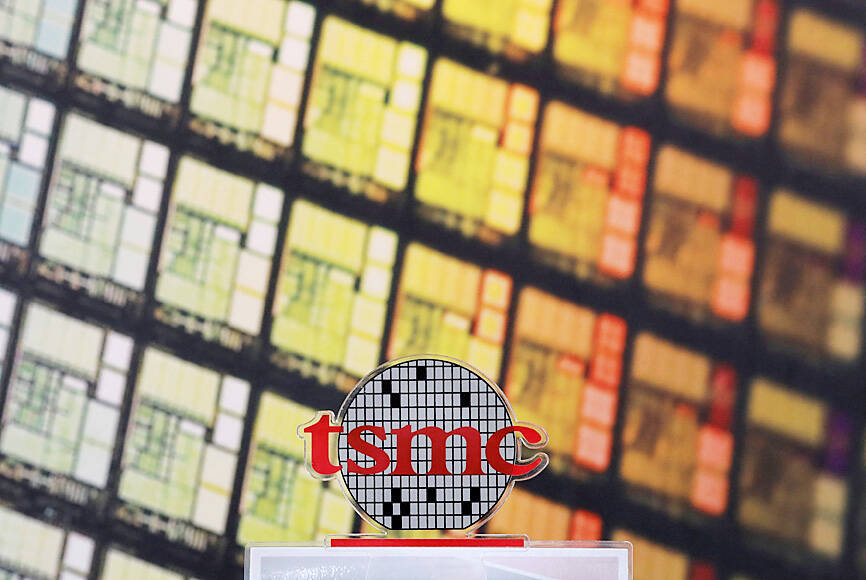Taiwan Semiconductor Manufacturing Co (TSMC, 台積電 ) yesterday said it is postponing the construction of a new fab in Kaohsiung for the production of 7-nanometer (nm) chips in response to weak demand, but the world’s biggest contract chipmaker reiterated its commitment to continue investing in advanced technology in Taiwan.
TSMC chief executive officer C.C. Wei (魏哲家) made the announcement at an Industrial Technology Research Institute (工研院) event in Hsinchu yesterday, after recent speculation about the company’s capacity expansion plan in Kaohsiung.
Last month, Wei told investors that TSMC had initially planned to build two factories to make 7-nanometer and 28-nanometer wafers in the new Nanzih Technology Industrial Park in Kaohsiung.

Photo: Tyrone Siu, REUTERS
With the semiconductor industry entering an inventory correction cycle, TSMC has “adjusted” the fab for the 7-nanometer factory due to weak demand for chips used in smartphones and computers, Wei said.
In the fourth quarter of this year, the capacity utilization of 7-nanometer and 6-nanometer chips would not be as high as it had been in the past three years, he said.
However, the plan to build the 28-nanometer fab would proceed on schedule and could even be expanded, he said.
The chipmaker has yet to break ground on either project. A groundbreaking ceremony for the park was held in August. The park is on a site where state-owned oil company CPC Corp, Taiwan (中油), used to operate a naphtha cracker.
To build a resilient supply chain, TSMC is building capacity in the US and Japan. The Wall Street Journal reported on Thursday that TSMC aimed to build a second chipmaking plant in Arizona.
TSMC said it is evaluating the possibility of the expansion plan, but nothing is substantial yet.

TAKING STOCK: A Taiwanese cookware firm in Vietnam urged customers to assess inventory or place orders early so shipments can reach the US while tariffs are paused Taiwanese businesses in Vietnam are exploring alternatives after the White House imposed a 46 percent import duty on Vietnamese goods, following US President Donald Trump’s announcement of “reciprocal” tariffs on the US’ trading partners. Lo Shih-liang (羅世良), chairman of Brico Industry Co (裕茂工業), a Taiwanese company that manufactures cast iron cookware and stove components in Vietnam, said that more than 40 percent of his business was tied to the US market, describing the constant US policy shifts as an emotional roller coaster. “I work during the day and stay up all night watching the news. I’ve been following US news until 3am

UNCERTAINTY: Innolux activated a stringent supply chain management mechanism, as it did during the COVID-19 pandemic, to ensure optimal inventory levels for customers Flat-panel display makers AUO Corp (友達) and Innolux Corp (群創) yesterday said that about 12 to 20 percent of their display business is at risk of potential US tariffs and that they would relocate production or shipment destinations to mitigate the levies’ effects. US tariffs would have a direct impact of US$200 million on AUO’s revenue, company chairman Paul Peng (彭雙浪) told reporters on the sidelines of the Touch Taiwan trade show in Taipei yesterday. That would make up about 12 percent of the company’s overall revenue. To cope with the tariff uncertainty, AUO plans to allocate its production to manufacturing facilities in

Six years ago, LVMH’s billionaire CEO Bernard Arnault and US President Donald Trump cut the blue ribbon on a factory in rural Texas that would make designer handbags for Louis Vuitton, one of the world’s best-known luxury brands. However, since the high-profile opening, the factory has faced a host of problems limiting production, 11 former Louis Vuitton employees said. The site has consistently ranked among the worst-performing for Louis Vuitton globally, “significantly” underperforming other facilities, said three former Louis Vuitton workers and a senior industry source, who cited internal rankings shared with staff. The plant’s problems — which have not

TARIFF CONCERNS: The chipmaker cited global uncertainty from US tariffs and a weakening economic outlook, but said its Singapore expansion remains on track Vanguard International Semiconductor Corp (世界先進), a foundry service provider specializing in producing power management and display driver chips, yesterday withdrew its full-year revenue projection of moderate growth for this year, as escalating US tariff tensions raised uncertainty and concern about a potential economic recession. The Hsinchu-based chipmaker in February said revenues this year would grow mildly from last year based on improving supply chain inventory levels and market demand. At the time, it also anticipated gradual quarter revenue growth. However, the US’ sweeping tariff policy has upended the industry’s supply chains and weakened economic prospects for the world economy, it said. “Now